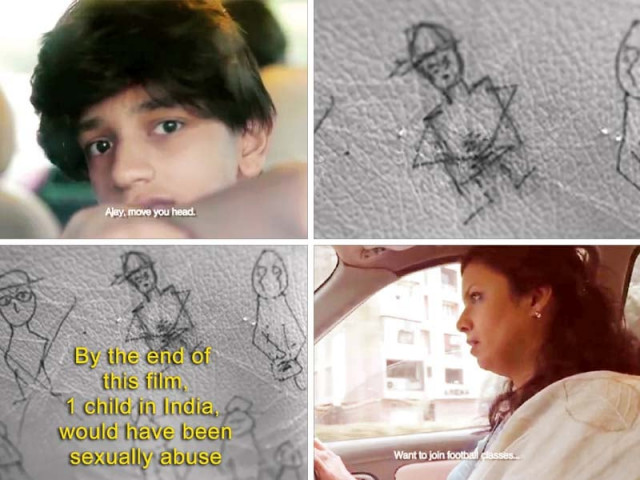Say no to child abuse
What is child abuse and neglect?

DESIGN BY HIRA FAREED
In an ideal world, the most hurt a child should suffer would be a mere laceration or two sustained while playing outdoors. Unfortunately for Salman Ali* and many of his peers, the idea is nothing more than a fantasy. How could it be, when the five-year-old was recently brought to a clinic with broken incisors and multiple injuries across his tiny body? Just like him, three-year-old Zain Arbab* was rushed to the ICU in a state of unconsciousness resulting from an intracranial hemorrhage. Their physical conditions alone would have been enough of a downer, had it not been for the fact that they were put here by their own parents — people who should have protected their children from the outside world.
But like I said earlier, this isn’t an ideal world. Salman and Zain are victims of child abuse and neglect, sharing their fate with over six million reported cases and countless others who might have been lost in the spiral of silence. The children have little choice but to accept the abuse, considering their young ages and close relations to their offenders. Salman, for instance, was injured by his stepmother and Zain by his immediate uncle. How can anyone expect them to escape? There are few in our society willing and able to understand child abuse, let alone be bothered to eradicate it. But awareness must be spread, lest more innocent lives are lost or ruined forever.
What is child abuse and neglect?
By definition, the word ‘abuse’ entails treating another with cruelty or violence, be it physical, emotional or psychological. It may be of any kind; the fact of the matter is that it will always perpetrate a negative reaction within the abused. Especially in the case of children, their young, impressionable minds are likely to develop feelings of despair, anger, loneliness, danger and paranoia when subjected to such traumatic experiences in the early ages. Nonetheless, one must understand the different ways in which they might be abused by others, voluntarily or involuntarily.
Emotional abuse: Actions do not always speak louder than words and when it comes to emotional abuse, this could not be truer. Some examples of emotional abuse include the following:
• The constant belittling, shaming and humiliation of another.
• Calling names and making negative comparisons of a person to another.
• Telling a child he or she is bad, worthless or a mistake.
• Frequent yelling, threatening or bullying, especially without legitimate reasoning.
• Ignoring or rejecting a person as punishment or showing them the silent treatment.
• Limited physical interactions, especially with children i.e. no hugs, kisses or other signs of affection.
• Exposing the child to violence or the abuse of others, whether it is the abuse of a parent, sibling or even pets.
Physical abuse: Due to visibility, physical abuse is much easier to identify. It involves inflicting physical harm or pain on another i.e. hurting them deliberately. In Pakistan, parents often confuse physical abuse with strong disciplinary tactics, believing that the harsher they are with the child, the more likely the latter is to behave. Shoes, belts and clothes hangers are just some of the items that are often employed in the process. What we fail to realise is that there is a fine line between physical punishment and physical abuse and the objective of the former is to teach children right and wrong — not make them live their lives in fear.
Child neglect: Arguably, this is the most common form of abuse as many parents do it from time to time, whether they wish to or not. Neglect can simply be described as an inability or reluctance of a parent to provide their child with the basic needs of life, such as food, clothing, hygiene and shelter. As it is rather simple in nature, it can be very difficult to spot neglect. It is also contingent upon the physical and mental state of the parent. In many cases, a serious injury or untreated depression or anxiety renders a parent incapable of caring for their child. In other cases, they simply might be too preoccupied with their career or other activities to care.

SOURCE: WWW.HELPGUIDE.ORG
Breaking the silence
The power of social media is indeed commendable. There is much action being taken online against child sexual abuse. Not only are average individuals speaking up against it, there are also some organisations working to eradicate this most evil of habits from society. Amongst the most popular ones are Bachpan Bachao Andolan and Kailash Satyarthi Children’s Foundation in India. Both organisations recently joined hands and launched the ‘Full Stop: Break the Silence’ campaign on September 24. In just over a week, thousands of people have uploaded pictures themselves, showing one palm coloured red in support of the campaign. A Public Service Announcement (PSA) in the form of a video entitled ‘Listen. Full Stop’ has also been aired with hopes to help parents spot symptoms of abuse in their children. You can watch the video here: http://www.ytpak.com/watch?v=HNoCJoZVXN4
Published in The Express Tribune, Ms T, October 4th, 2015.



















COMMENTS
Comments are moderated and generally will be posted if they are on-topic and not abusive.
For more information, please see our Comments FAQ